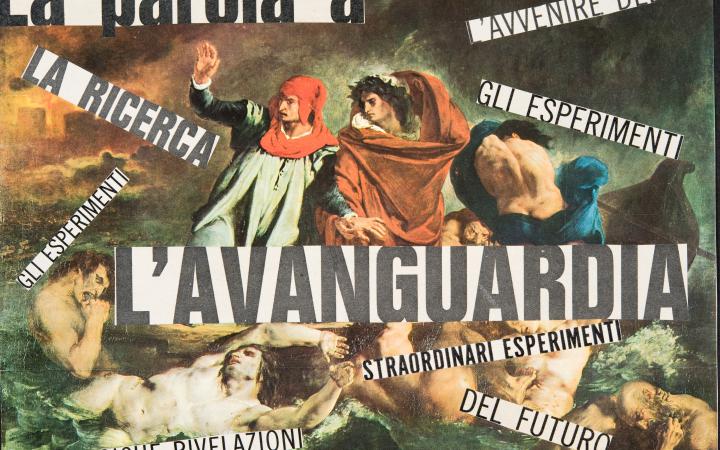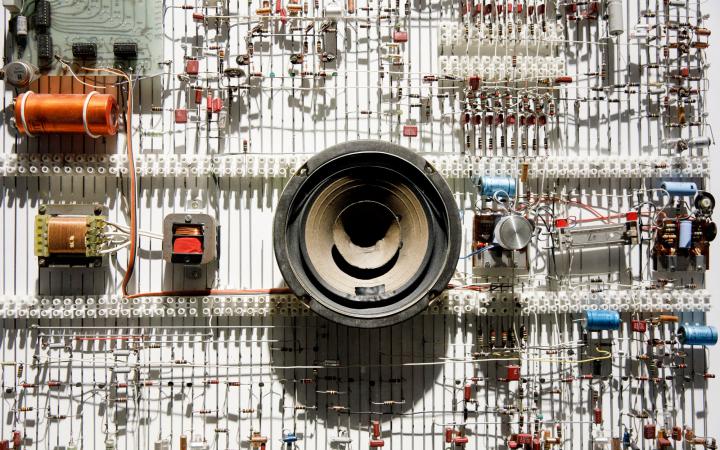Left-wing activists
2017-05-22
![Nanni Balestrini, »Epoca« [Epoch], 1971, collage, paper, 30,5 x 25 cm / © Nanni Balestrini Nanni Balestrini, - Epoca](https://zkm.de/sites/default/files/styles/r17_720/public/bild/2017_zkm_nanni-balestrini_epoca_003.jpg?itok=QXkbkqEq)
With »We Want Everything«, artist and author Nanni Balestrini created the most important literary piece relating to the left backlash in Italy in the 1970s.
This is not an easy agenda for a literary text. In his 1989 novel »L'editore«, the author, activist and artist Nanni Balestrini – the ZKM is exhibiting a cross-section of his impressive artistic work until the beginning of July with »If you read this, you must no longer fear anything« – presents his own opinion which still resurfaces in text in various forms and from various angles.
Giangiacomo Feltrinelli, the famous founder of the Feltrinelli publishing house, who went underground in 1969 as an activist and died in 1972 under circumstances which have still not been fully explained today, is this dead person – »The Editor«. The »rebellious son of rich and powerful Milan«, as he is described in the novel, was also a friend of Balestrini. In his tragic story, the author tries to explain the battles and contradictions of the left-wing movements in Italy in the late 1960s and 1970s.
Turning point for the Italian left-wing
Among the documentary sections, which could have come from police protocols and newspaper reports, the voices of four protagonists are mixed into this punctuation-free novel. 15 years later, they try to write a screenplay about the results. Their approaches to explaining Feltrinelli’s death, which is understood to be a turning point for the Italian left-wing, the spark to ignite a new generation of armed resistance, fail.
»This death, the history of this death must be a story that tells other stories.«
In Italy, the dozen years after 1969 is also known as the »Years of Lead« and, contrary to what German producer Margarete von Trotta meant in her film of the same name, the »lead« also relates to weapons. From the many left activist movements and groups – the communist, violent »Brigate Rosse«, women’s groups like the »Lotta Femminista«, the student group of »Lotta Continua«, which developed from the FIAT strike, and the radical »Potere Operaio«, whose founders included both »Empire« co-author Toni Negri and Nanni Balestrini – the »Autonomia« movement finally emerged from the Italy of the 1970s.
»Years of Lead«
The members of »Autonomia« rejected established political structures and institutions. They expressed their opposition in many counter-cultural practices: Squatting, supermarket looting, fare dodging, the Metropolitan Indians movement or the foundation of free and alternative media. The counter-movements culminated finally in violent collisions of the 77 movement with the authorities, in the assassination of conservative politician Aldo Moro in 1978 by the Brigate Rosse and in the imprisonment of thousands of left-wing activists.
Even Nanni Balestrini, who was committed to various groups, journals and print collectives, was accused of »Membership to a Subversive Association« in 1979. He escaped imprisonment by fleeing over the Alps on skis to France. He only returned to his homeland after five years in exile in Paris, after investigations into him were suspended.
The left-wing movements in Italy had been practically demolished at this point. »[…] an entire political generation has disappeared,« lamented Balestrini in an interview in 1993. According to Balestrini, it hit the youth forming the 77 generation, most of whom came from proletarian backgrounds, especially hard:
»Thousands ended up in jail, were killed or were hooked on hard drugs. [...] the 77 generation has been spiritually, morally, mentally destroyed.«
In his three novels about the era of left activism between 1969 and 1977, which he combined into the »We Want Everything« trilogy in 1999, Balestrini, born in Milan in 1935, creates a moving poetic monument for these movements. The second novel »The Unseen« is about the 77 movement. It tells the biography of a young left-wing radical, as well as the story of a collective self, as is actually always the case with Balestrini.
School, squatter scene, high-security wing of a prison
There are dense, oppressive scenes, which are intertwined, from school, from the squatter scene, from the high-security wing of a prison. It doesn’t turn out well. The novel was made into a film in 1988 and was awarded a »New Cinema Award« at the Vienna Film Festival.
Speaking of himself, Balestrini doesn’t consider himself to be a »political author«. That would be too direct and too easy. Since he entered the cultural stage in the early 1960s as a representative of the Neoavanguardia, Milan-born Balestrini has become thoroughly politicized. It was unavoidable that this commitment and interest would flow into his art.
In contrast to Dario Fo, his colleague who was awarded the Noble Prize in 1997, and who along with his theatre company created satirical theatre pieces relating to the Commedia dell’Arte from the socio-political themes of the 1970s, i.e. the issues of operaismo and autonomism, Balestrini normally approaches his subjects as a documentarian of oral history.
Rachel Kushner, the celebrated American author of the novel »The Flamethrowers«, the second part of which is played out in 1969 in Turin and the surroundings on a country estate of a family not dissimilar to the Agnelli clan, wrote about him in New Republic in 2016:
»For Balestrini, who was not just a fighter and a theoretician, but also a poet and artist, a writer through and through, the report was a unique, artistic achievement and a new literary form, the reporting novel [...].«
This becomes particularly clear in his 1994 novel about the ultra-fans of AC Milan, »I Furiosi«. Balestrini does not judge, he seems only to record and arrange the material, the narratives of the hooligans, in which he finds elements of the left-wing counter-movements.
Lots of »passion« and »collective enjoyment«
»I Furiosi« received rave reviews, especially in its theatre production. The »spectacle« has been performed in Munich, Stuttgart, Vienna and finally in Rome during the European Championship year of 2016. And whatever can be said about ultras, even in Rome: The Corriere dello Sport found lots of »passion« and »collective enjoyment« in the play.
Asked afterwards whether he still thinks a lot about the left-wing, militant era of Italy, Balestrini said briefly in an interview: »This era has only left us one requirement: that we must change the world, and this is possible, necessary and urgent – even if we don’t manage it at once the way we want to.«
About the author
Stephanie Fezer lives in Berlin and works as a freelance author and editor. She studied German and English literary studies in Freiburg, Cologne and Berlin. In 2015, her translation of the novel »Torpor« by Chris Kraus was published by b_books.
Nanni Balestrini: For anyone reading ths there is nothing left to fear
Sat, 01.04.2016 – Sun, 02.07.2017
ZKM_Atrium 1+2
Cost: Museum admission
____
Current note
Michael Farin has produced an audio drama based on Balestrin's novel "L'editore" on behalf of Bayerischer Rundfunk. The first broadcast is on 3 November 2017. More information
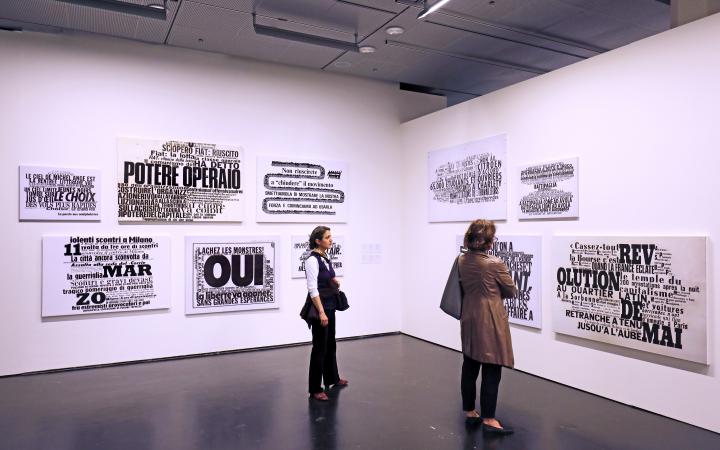
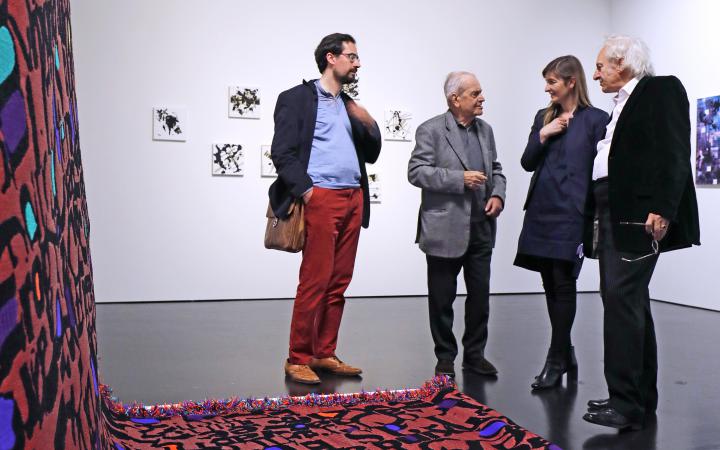
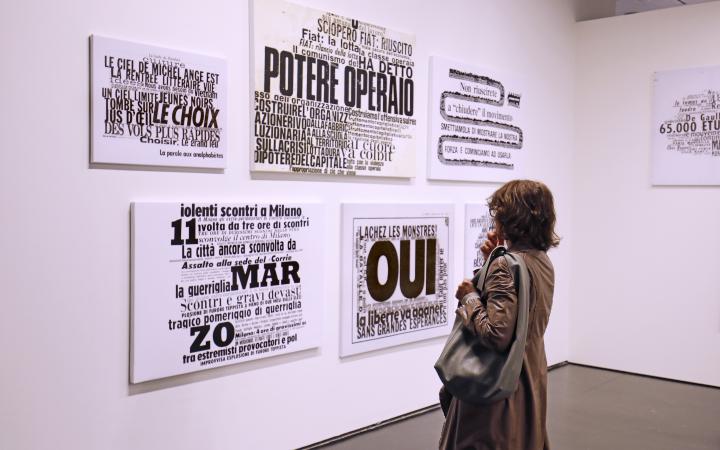
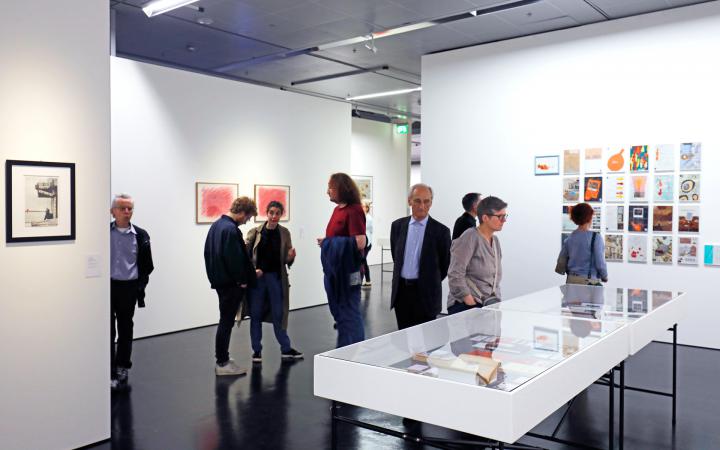
![Nanni Balestrini, »Lo scrittore« [The Writer], from the series »Cronogrammi«, 1963, collage, paper, 35 x 70 cm / © Nanni Balestrini Nanni Balestrini, »from the series« - Lo scrittore](https://zkm.de/sites/default/files/styles/r17_720/public/bild/2017_zkm_nanni-balestrini_lo_scrittore_001.jpg?itok=DYHXbuYU)
